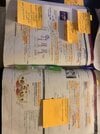- Joined
- Jun 22, 2020
- Messages
- 165
- Reaction score
- 162
I want you all's opinion on pre-studying for first year.
I am currently nailing down anatomy along with the functions. I am using an older FA book with the USMLE-Rx videos and the UMich Med School M1 "course" for gross anatomy. With that being said the "med school anatomy is much deeper than UG anatomy so it's a waste" comments aren't needed. I included a photo so you can see
I'm mostly seeking opinions from people who have done it. Was it beneficial? Did you remember the material when you started class?
I am currently nailing down anatomy along with the functions. I am using an older FA book with the USMLE-Rx videos and the UMich Med School M1 "course" for gross anatomy. With that being said the "med school anatomy is much deeper than UG anatomy so it's a waste" comments aren't needed. I included a photo so you can see
I'm mostly seeking opinions from people who have done it. Was it beneficial? Did you remember the material when you started class?
